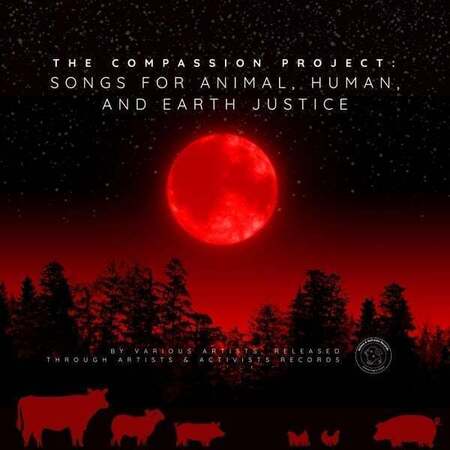
Activism through music is often a difficult balancing act where artists must walk the tightrope between advocating their cause and aiming for musical perfection. Artists & Activists Records tackles this challenge head-on with their ambitious project: “The Compassion Project: Songs for Animal, Human, and Earth Justice”
Featuring contributions from twenty-one artists with genres spanning folk, rock, world, and indie, the compilation sets out to align a plethora of urgent struggles, ranging from climate action and animal liberation to human rights and spiritual resilience, under one unifying theme: compassion.
https://aaarecords.hearnow.com/the-compassion-project
From the start, this album’s intentions are clear: each song is chosen not only for musical merit but for its ability to use it as a tool for change and progress. This is protest music in the broadest sense, not confined to one genre, but connected by a common call for justice, hope, and compassion.
The album begins in quiet reflection with North Carolina-based Kim Smith’s single: “Human.” This track is intimate and vulnerable, pleading with the listener to be humane and consider the interconnectedness of all people and the environment. This single stands out because of its stripped-back arrangement that lets the emotions take center stage.
The San Diego rock band Sometimes Julie switches things up with “I won’t go quietly,” a heavy protest anthem that calls audiences to “Resist, oppose, stand up, and demand change.” The shift to confrontation together with the immaculate production serves as proof that activism can also be catchy.
One of the standouts is William Robertson’s “One Day Chicks,” a scathing punk number that is blunt, uncompromising, and graphic. This single confronts the egg industry’s killing of male chicks, forcing us to face some uncomfortable truths.
The album closes with Danny Hamilton’s “Until we all rise,” a gentle ballad written in the aftermath of the George Floyd killing that points out that nothing will change for the better until “we all rise up.” featuring full orchestral backing and gospel notes with a full choir, this is a beautiful call for compassion and action.
The album’s diversity is both its appeal and its flaw. It spans a wide sonic terrain, but the production quality fluctuates; polished studio tracks rub shoulders with lo-fi recordings. Still, this very unevenness underscores the grassroots nature of the project: authentic voices gathered under a shared cause.
The Compassion Project situates itself in the long lineage of socially conscious compilations, from protest folk anthologies of the 1960s to modern climate-justice albums.
It demonstrates how music can move hearts where arguments cannot. In a time when the world often feels short on empathy, The Compassion Project argues that compassion is not just a feeling; it is an act, and sometimes, it is a song.
